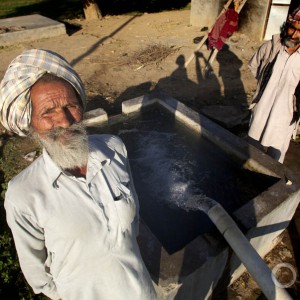Federal Water Tap, June 10: EPA Water Infrastructure Survey Also Asks About Climate Change
Pipe Schemes
U.S. water utilities will need to spend $US 384 billion between 2011 and 2030 to maintain adequate drinking water service, according to an Environmental Protection Agency infrastructure report to Congress. Prepared every four years, the report is used to allocate money to the states from a federal loan program for drinking water projects.
For the first time, the survey asked utilities which projects they plan to undertake in order to adapt to climate change. Only 144 systems – 1.4 percent of respondents – reported a “climate readiness” project, a term that the EPA did not define. The EPA did, however, allow respondents to select from a menu of categories the broad need. The most frequent category cited for climate readiness (one-third of responses) was emergency power, which has bedeviled utilities during catastrophic storms like Hurricane Sandy last fall.
Circle of Blue will run a longer story on the climate aspects of the infrastructure survey this week.
Colorado River Basin Study
In late May state and federal officials met in San Diego and announced three working groups that will offer recommendations for water conservation in the Colorado River Basin. The Bureau of Reclamation provided Circle of Blue the names of the organizations and individuals who will participate in each group.
The duties for the three groups are as follows:
- The municipal-industrial group will tally how much water each municipality that relies on the Colorado River has conserved or reused since it began such programs and how much might be conserved by 2060, the time period for a Bureau of Reclamation study of supply and demand in the basin, completed last winter. The group is led by representatives of the Arizona Municipal Water Users Association, Metropolitan Water District of Southern California and Denver Water.
- The agricultural group will prepare a report assessing water conservation by farmers and water transfers both within and outside of the basin. The group, led by representatives of the Bureau of Reclamation, Imperial Irrigation District, and Colorado State University, will also document the potential water savings from planned future conservation or transfers.
- The environmental group will write a report on stream flow requirements and uncertainty in scientific models for stretches of the river deemed vulnerable by the Reclamation study. The group is chaired by representatives of the Bureau of Reclamation, the Nature Conservancy, and the Colorado Water Conservation Board.
The reports will be completed by the end of the year, according to the Bureau of Reclamation.
Fracking Study Extension
The Bureau of Land Management extended by 60 days the comment period for its proposed regulations for fracking on federal lands. Comments are now due August 23.
Saltwater Intrusion
The U.S. Geological Survey developed models to assess how rising seas will affect the water table on Assateague Island, a barrier island shared by Virginia and Maryland. The island is home to a federally protected bird species whose habitat may be altered as the oceans push into shallow aquifer and turn it salty.
Susquehanna Water Plan
A Congressionally created commission that oversees the Susquehanna River Basin will release an update to the basin’s water management plan at a meeting on June 20 in Harrisburg, Pennsylvania.
Federal Water Tap is a weekly digest spotting trends in U.S. government water policy. To get more water news, follow Circle of Blue on Twitter and sign up for our newsletter.
Brett writes about agriculture, energy, infrastructure, and the politics and economics of water in the United States. He also writes the Federal Water Tap, Circle of Blue’s weekly digest of U.S. government water news. He is the winner of two Society of Environmental Journalists reporting awards, one of the top honors in American environmental journalism: first place for explanatory reporting for a series on septic system pollution in the United States(2016) and third place for beat reporting in a small market (2014). He received the Sierra Club’s Distinguished Service Award in 2018. Brett lives in Seattle, where he hikes the mountains and bakes pies. Contact Brett Walton






Leave a Reply
Want to join the discussion?Feel free to contribute!